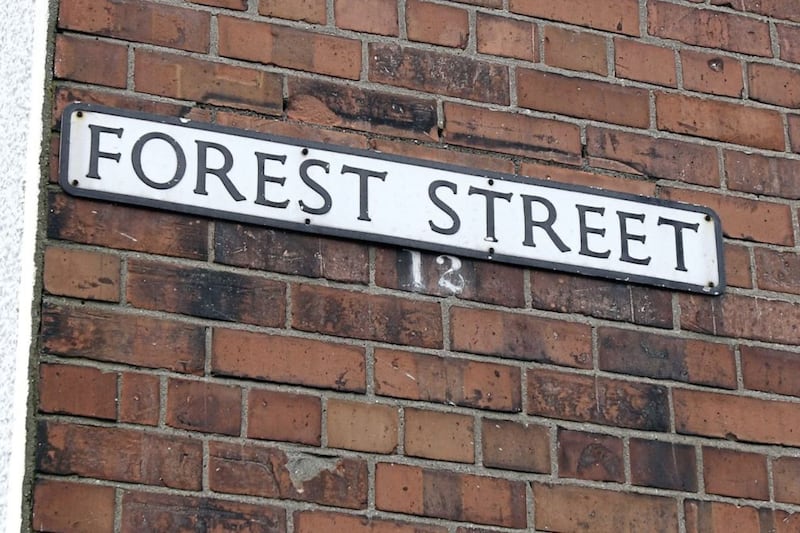DESPITE growing up in a house-lined street called Forest Street, there wasn’t a life-affirming tree or an urban green space as far as both eyes could see.
At the business end, Mackie’s giant factory fan would deliver the finest quilt of by-produced sand onto Wee Fort Street’s hill each day like metronomic clockwork.
The consolation for ecological chaos and environmental non-sustainability was that, despite the obvious lack of nitrogen and oxygen and the shadow of a million mile-high brick wall, we got to play beach football, handball and hurling every single day in life.
There were drawbacks surely, on reflection. We were oblivious then to the daily non-existent air quality that might nowadays have Frank or Cecilia diving for cover at half-six in double PPE and n95 respirators.
And neither did we have the sea that normally comes with the beach to go skipping into for a post FA Cup/All-Ireland final recovery dip and stretch.
Helen’s Bay may as well have been Summer Bay. Tyrella sounded like an island with coconuts and speedboats located somewhere between Judith Chalmers and Spain.
Those nuances mattered not a bit though.
Air quality wasn’t great indoors anyway thanks to the forest fire of Embassy number 10s.
We also went to the Falls Baths every second Friday because the ocean was where fish, pasties and steakettes were caught before being cooked to Bib Gourmand perfection by big Eddie’s people.
Most important of all, each of us developed first touches and half-volleys like 1982 Brazilian number 10s and we could kick sand into defenders’ eyes from an impressive distance with the best of them.
It arguably wasn’t the Copacabana of Barry Manilow’s childhood or even Zico’s prime, but here, ‘every cloud of sand...’ as they say.
What’s more, recycling back then was usually all about flying back round to the shop on the Grifter like a young Stephen Roche to grab 10 fegs and a loaf for your ma half-an-hour after you’d grabbed 20 fegs for your da.
Bottle bins, blue bins and brown bins were the type of stuff Maggie Philbin would have warned us all about on Tomorrow’s World while we were eating battered chow out of the Irish News and trying to read both sides through a congealed hummock of gravy chips simultaneously.
What a time to be just about alive.
Anyway, where were we going with this? Yes, Forest Green Rovers, carbon neutrality and the innovative strides being made in the synergizing worlds of eco-friendliness and football, obviously.
The go-ahead English League Two side, who wouldn’t spit on a pastie bap or be seen dead with a steakette by the sound of them, will face Colchester today in a football-first – wearing shirts partly made of waste coffee and plastic bottles.
The players currently strut their stuff in shirts made mainly of bamboo but owner Dale Vince swears that using leftover coffee grounds makes the shirts even more eco-friendly and lighter to wear.
“It’s just about not using a virgin material,” Vince told the Beeb.
“The shirts are a combination of coffee grounds and recyclable plastic bottles, which is a special process, so everything in them is recycled or organic.
“We think it’s lighter than the bamboo, and apparently it breathes better, which is a surprise to me, but there is a performance benefit from minimising plastic because you sweat more and get hotter.
“But you need that blend (I see what you did there Dale) because the shirts also need to be super tough, especially when you’ve a six feet seven inch defender who couldn’t kick back doors trying to use you as a ladder to head to the ball as it falls from the moon’s organic crust.”
Okay, he stopped his spiel at tough, but we know what he means.
We can only presume at this stage that wearing it at about 11am while mauling two Wagon Wheels and a heel of buttery toast or three also gives you a nice transdermal jolt for the day ahead.
The club was commended four years ago by Fifa as “the greenest football club in the world”, notwithstanding Glasgow Celtic obviously, and are also the first carbon-neutral club as certified by the United Nations.
Rovers also launched a vegan food company a couple of years ago, a plant-based diet is offered to all staff, the pitch is organic and pesticide-free and a new stadium made entirely out of wood is on the agenda, which doesn’t sound ideal by any stretch unless you’ve some issues and are still into Subbuteo.
Still, all said, the world of football has clearly come a long away from headers, volleys and potential COPD in the sand outside a textile machinery engineering foundry at the end of your street during the dirty ’80s.
A shirt made of cappuccino and caramel latte muck is one thing, though.
Just as long as there are no empty cider bottles in the cheeseburgers or bamboo shoots in the quick pint at half-time and beyond.
Mind you, I’m fairly sure this increasingly greenish traveller has eaten and drunk much worse once or twice in the very distant past at Irish League grounds the, er, world over.





